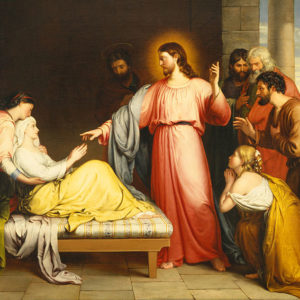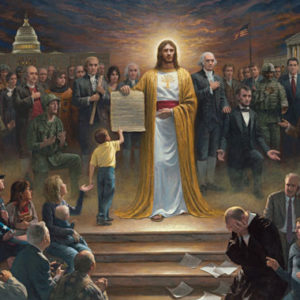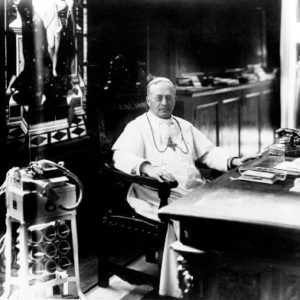A Baptist preacher on the radio this morning claimed that the only person in the Bible to encourage praying to angels was Satan, when he tempted our Lord in the wilderness. This claim is wrong, but in a revealing way.
Tag: apologetics
What Does it Mean to Say That Jesus “Became Sin”?
St. Paul in 2 Corinthians 5 has an odd expression, in which he says that God the Father made Christ, who knew no sin, “to be sin.” What on earth does THAT mean?
In Defense of Exaggerated Marian Devotion
Protestants aren’t the only ones who find Catholic devotion to Mary a bit over-the-top sometimes. A lot of Catholics find other Catholics, including great Saints like Alphonsus Liguori and Louis de Montfort, to be a little “much” when talking about the Virgin Mary. I get it. Take the Salve Regina, for example: it calls Mary “Our Life, Our Sweetness, and Our Hope.” How is that kind of effusive flattery theologically defensible? After all, Our Life and our Hope is Jesus Christ.
Is Salvation Our Doing, or God’s?
What percentage of our salvation is our doing, and what percentage of it is God’s doing? This is a common way of approaching the question of salvation, and it’s a driving force for a lot of bad theology. For example, Steven J. Cole claims that Roman Catholicism “teaches that in order to gain enough merit for salvation, we must add our good works to what Christ did on the cross.” That’s a common misunderstanding: since Catholics believe human cooperation is necessary, that must mean we’re reducing God’s credit from 100% to something lower, right? And it’s ultimately for this reason that Martin Luther and later Protestants (most famously Calvinists) will argue that man’s free will in the realm of salvation is basically an illusion: we provide 0% to salvation. Why? To ensure that God gets 100%.
The Virgin Mary’s Unique Role in the Salvation of the World
Whether you’re Catholic or Orthodox or Protestant, you owe a great debt of gratitude to the Virgin Mary, because there’s a special way in which you owe your salvation to her. This claim often sounds heretical, particularly to Protestant ears, so here’s the basic reason Catholics say this…
Do Catholics Make Christianity Too Difficult?
A common complaint against Catholicism is that its view of the spiritual life is too difficult, that it over-complicates Christianity and doesn’t trust enough in the finished work of Christ on the Cross. That’s an appealing complaint, since it proposes a lighter, easier Christianity. But it’s a view we should be extremely suspicious of, given everything else we know about reality. So here are six observations that I think have some bearing on how we think of salvation specifically and the spiritual life more generally:
Were St. Peter and the Other Apostles Celibate?
One of the common arguments against clerical celibacy is that St. Peter, the leader of the Apostles and the first pope, was married. After all, Scripture refers to his having a mother-in-law (Matthew 8:14-15), and St. Paul (referring to Peter by his original Aramaic name, Cephas) defends his Apostolic authority in a verse usually translated “Do we not have the right to be accompanied by a wife, as the other apostles and the brethren of the Lord and Cephas?” (1 Corinthians 9:5). But let’s take a closer look at those passages, and find out what the New Testament REALLY has to say.
What’s the Biblical Model of Church Leadership?
Protestants often assume that the monarchical structure of the Catholic Church is due to Catholics relying too much on structure of the Roman Empire and not enough on the structure established in the Bible. Perhaps it would be better to say that it’s Protestants who are overly indebted to the structure of the United States and Western liberal societies, to the extent that they’ve ignored that God established a Kingdom, and not a Democracy. Consider how the People of God were governed throughout all of history.
A Timely Reminder
“The Church founded by the Redeemer is one, the same for all races and all nations. Beneath her dome, as beneath the vault of heaven, there is but one country for all nations and tongues; there is room for the development of every quality, advantage, task and vocation which God the Creator and Savior has… Continue reading A Timely Reminder
Want to Pray Well? Study Well
This afternoon, I gave a talk to the returning teachers at Christ the King on the virtue of study. I made four basic points:
1) Reason is good, and ordered towards God, since all truth is of the Holy Spirit.
2) Therefore, studiousness is a virtue that we ought to practice.
3) This is particularly true of Catholic school teachers, given their unique calling.
4) Studiousness must be rooted in prayer, and should help us to pray better.
Here’s the text of the full talk:
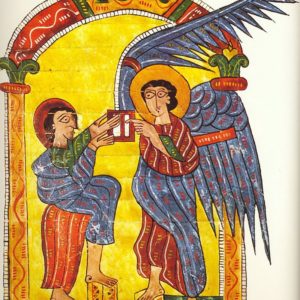
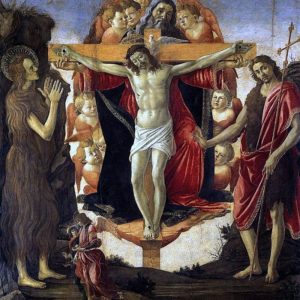
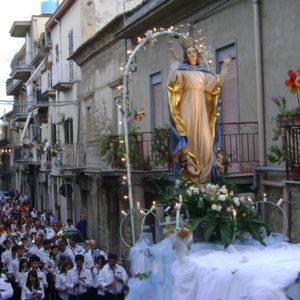
![Michelangelo, Creation of Adam (1512) [from the Sistine Chapel ceiling]](http://shamelesspopery.com/media/2017/09/Adams_Creation_Sistine_Chapel_ceiling_by_Michelangelo_JBU33-300x300.jpg)


